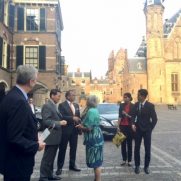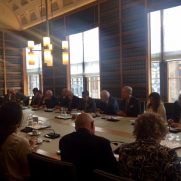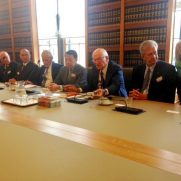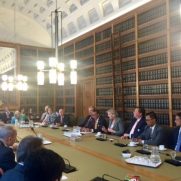01 Oct 2016
By Hans Sprokkreeff
A special activity of the INS is annually organizing a Round Table Meeting, usually held in the Eerste Kamer (Senate) of the Dutch Parliament and hosted by the President of the Senate.
The purpose of this meeting is that members of the senate and other politicians can freely discuss political and governmental affairs between Indonesia and the Netherlands.
Freely indeed, because these talks are held under Chatham House Rule, that means that anyone who comes to the meeting is free to use information from the discussion for his or her own purpose, but is not allowed without permission of the attendees to reveal who made any comment. It is designed to increase openness of discussion. Therefore is it only with the specific permission of the speakers that this report is published.
- INS Round Table Meeting on 22 September 2016
Subject
This year the Round Table Meeting took place on 22 September and the subject was the ‘Current State of Play of Indonesian Politics and 2019 Prospects’. The meeting was chaired by Dr Willem F. van Eekelen, former Minister of Defence. Special guest was Dr Hassan Wirajuda, former Minister of Foreign Affairs of the Republic of Indonesia, who gave a keynote speech.
Other speeches were given by H.E. mr I Gusti Agung Wesaka Puja, Ambassador of the Republic of Indonesia; Dr Nikolaos van Dam, former Ambassador to Indonesia and Dr Bernard Bot, former Minister of Foreign Affairs of the Netherlands.
The INS expresses her gratitude to Mrs Ankie Broekers-Knol, President of the Senate, for hosting the meeting.
Economic performance of Indonesia
After words of welcome from Mrs Ankie Broekers-Knol, the floor was given to Ambassador Puja. The ambassador analysed the effect of democracy on economic performance which had paid off so well in the case of Indonesia. In the past years the Indonesian economy had seen impressive GDP growth and was currently among the strongest economies in the world.
In introducing the keynote speech of Dr Hassan Wirajuda, chairman Dr van Eekelen memorised the Linggarjati award granted to him two years ago together with Dr Bernard Bot, when both were Ministers of Foreign Affairs. Their cooperation contributed to a milestone event in the Indonesian – Dutch relations with the formal acceptance of 17 August 1945 as the official date of Indonesian Independence.
Speech Dr Wirajuda
Dr Wirajuda started his speech by referring to the very good relations between his country and the Netherlands. He subsequently took his audience for a tour of the recent developments in Indonesian democracy, starting with the direct Presidential elections in 2004 combined with elections for the Parliament as well as local elections. He linked the subsequent beneficial economic performance to democratic gains, culminating in Indonesia being invited to join the G-20 in 2008, as the 16th biggest economy in the world. Dr Wirajuda gave an overview of the 2014 Presidential elections and the way President Joko Widodo consolidated his position in recent months. Jokowi succeeded in winning over support from parties that were until then part of the opposition. He now commands a clear majority in Parliament. Jokowi’s method of soft persuasion is as effective as it is impressive. His chances for re-election in 2019 look good. A few weeks ago a new Finance Minister has been appointed. Through tax amnesty she is trying to get capital that previously left the country in foreign, mostly offshore accounts, back to Indonesia. In this connection an estimated amount of 400 billion US$ of Indonesian money would be locked away in Singapore bank accounts. Dr Wirajuda finished his speech on a happy note saying that a recent poll indicated that 65% of Indonesians are optimistic about their future.
Speech Dr Van Dam
The next speech was delivered by Dr Nikolaos van Dam who was, until recently, Special Envoy of the Dutch Government for Syria. Dr Van Dam gave an overview of the situation in Syria, was pessimistic about a negotiated settlement on the short term and saw at this moment in time only a military outcome. Humanitarian aid was obstructed and there were many civilian casualties. For a breakthrough to a more durable solution for the conflict, the participation of the regime of Syria (President Assad) would seem unavoidable. However, President Assad would at this moment not in any way respond favourably to an initiative in this direction from the West as it had put all its cards on support to the opposition. Dr van Dam signalled as one of the possible options for the next steps the involvement of neutral parties in the conflict, parallel to the present UN efforts. They might be able to get parties to the negotiating table. He suggested that Indonesia could perhaps play a role in this respect.
Speech Dr Bot
After the presentations of Dr Wirajuda and Dr van Dam, the floor was given to Dr Bernard Bot, who called to memory the Comprehensive Partnership he concluded with his counterpart Dr Wirajuda at the time when both were Ministers of Foreign Affairs. The agreement went into force many years afterwards. For the near future Dr Bot foresaw a period of stability for Indonesia, especially as the President has been able to secure support of a majority in Parliament.
There are, however, worrying developments with regard to the politics of China. China is more and more presenting itself with self-consciousness at the regional as well as the world stage. The result is a shifting attention of the US to Asia, while an answer from Europe towards these developments in Asia is lacking. The US is strengthening its anchor points in Asia, amongst which Indonesia. Europe needs to intensify its policy towards Asia, beginning with its ties to ASEAN and ASEM. The Netherlands could play a central role in shaping a stronger European approach and in this respect build on its special friendship with Indonesia.
Reaction Dr Wirajuda
In the ensuing discussion Dr Wirajuda showed hesitation when it came to the possibility of more involvement of Indonesia in matters regarding the conflict in Syria or a leadership role in ASEAN. The President has in the first two years of his tenure focussed on internal (domestic) matters and has given less attention to international affairs. The problems in the Middle East are complex, and, as he put it “more killing than kissing”. Although Indonesia’s main focus is on the economic opportunities in Asia, the country views the presence of nuclear weapons in countries in Asia (viz Pakistan, India, China and North Korea) with concern as well as the policies of China with regard to the South Chinese Sea
Q&A’s
During the final part of the meeting, the Q&As, there was a common view that the policies of China do pose challenges and that it carried inconsistencies. On one hand Beijing antagonises its neighbours with the unilateral demarcation line in the South Chinese Sea and on the other hand it cooperates in the economic field, e.g. the Asian Infrastructure Investment Fund.
Closing remarks Mr Kuijper
The Chairman of INS, Mr Jesse Kuijper, spoke closing remarks for the meeting. He reiterated the importance of eye to eye contacts to forge closer relations between our two countries.







